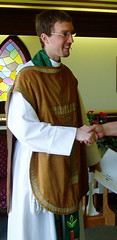Pages
▼
Sunday, June 19, 2005
Sunday, June 12, 2005
Luther in Legos
No, not the capitol of Nigeria, but rather, the little plastic building block. Yes, that's right, Luther in Legos!!
Tuesday, June 07, 2005
Joseph Sittler
Apparently, one can hear and see Sittler in action at his new web accessible archives (click on his name above).
Office & office
Yesterday I picked up Sittler's little book, The Ecology of Faith, and was re-reading it. I came across this section in the chapter colorfully titled, "The Maceration of the Minister" on the self-image of the minister. I am a lucky pastor in many ways, because the things Sittler describes in this chapter are not necessarily true of my situation, but the self-image thing is so true. The modern self-image of the pastor is confused, and is probably more to blame for clergy burn-out than anything else.
So, to quote Sittler (this written in 1961- a pastor and friend who preached on this at my ordination gave me my first copy of Sittler's book for my "Office", and a ream of paper for my "office"- I have made the language gender-inclusive):
A minister has been ordained to an Office; he or she too often ends up running an office. They were solemnly ordained to the ministry in Christ's church. Most of the pastors I know really want to be what they intended and prepared for. Instead they have ended up in a kind of dizzy occupational oscillation. They are aware of the truth of what Karl Barth said in one of his earliest addresses, "Our people expect us to take them more seriously than they take themselves, and they will not thank us if we do not do so." Most ministers are aware that it is tough and delicate labor to insert the lives power of the Word of God into the rushing occupations and silent monologues of people. They reall with a sense of joy the occasions when honest work and unhurried reflection gave a strange victory to their efforts. But these occasions are infrequent, set amid great stretches of guilt-begetting busyness.
And Sittler doesn't let us off the hook. We are responsible for our self-image. So:
It is, I think, simply not true that the parish demands of its minister that he or she become simply an executive officer of multiple activities. It is likely to accept, support, and be deepeningly molded by the understanding of Office and calling which is projected by its minister's actual behavior. It will come to assess as central what he or she, in their actual performance of their ministery and use of time, makes central.
I would love to post the whole chapter, but for that, I encourage any and all to pick up Sittler's little book. In the meantime, I will dwell with these words.
So, to quote Sittler (this written in 1961- a pastor and friend who preached on this at my ordination gave me my first copy of Sittler's book for my "Office", and a ream of paper for my "office"- I have made the language gender-inclusive):
A minister has been ordained to an Office; he or she too often ends up running an office. They were solemnly ordained to the ministry in Christ's church. Most of the pastors I know really want to be what they intended and prepared for. Instead they have ended up in a kind of dizzy occupational oscillation. They are aware of the truth of what Karl Barth said in one of his earliest addresses, "Our people expect us to take them more seriously than they take themselves, and they will not thank us if we do not do so." Most ministers are aware that it is tough and delicate labor to insert the lives power of the Word of God into the rushing occupations and silent monologues of people. They reall with a sense of joy the occasions when honest work and unhurried reflection gave a strange victory to their efforts. But these occasions are infrequent, set amid great stretches of guilt-begetting busyness.
And Sittler doesn't let us off the hook. We are responsible for our self-image. So:
It is, I think, simply not true that the parish demands of its minister that he or she become simply an executive officer of multiple activities. It is likely to accept, support, and be deepeningly molded by the understanding of Office and calling which is projected by its minister's actual behavior. It will come to assess as central what he or she, in their actual performance of their ministery and use of time, makes central.
I would love to post the whole chapter, but for that, I encourage any and all to pick up Sittler's little book. In the meantime, I will dwell with these words.
